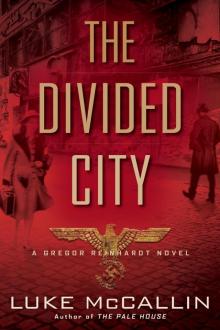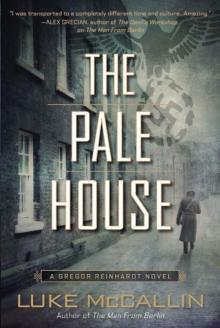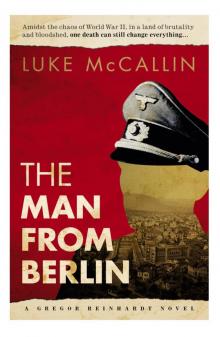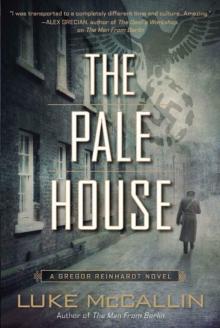- Home
- Luke McCallin
The Pale House Page 15
The Pale House Read online
Page 15
He stopped. He had never told anyone of this. Not Brauer, his friend and partner in the Kripo of some twenty years. Nor, as much as he should have, his son Friedrich, estranged, lost to him, now, a corpse somewhere on the Eastern Front. He looked down at as she wiped a tear away. His throat felt raw, as if someone else had been using it. Which, in a way, was true.
“You know, a gentleman should not reminisce about his past loves in front of another woman.”
“I’m sorry.”
She laughed, sniffed back more tears, and he smiled to see her as she fussed through her pockets. “No. It’s me. I should not make light of such things.” She blew her nose on the handkerchief she managed to find at last, and then she took his arm in hers, and it felt natural there as they walked. “Now, you are here again. The same man? Or different?”
“Different. The same. Full circle. Back to where I was two years ago. Alone. Surviving,” he said, staring up at the slate glower of the sky, weighing what he had said. They walked on, and then she paused, looking back across the river at a clutch of vehicles parked in front of a villa with a white façade. Ustaše stood around the cars, talking, smoking, or wandering up and down the rows of people, women, mostly, outside the house.
“What is that place?”
“That is the Pale House,” she answered. He looked down at her, and she turned her head toward him, although her eyes remained fastened on the house. “Maks headquarters,” she continued, her eyes coming around to meet his. “It is a terrible place. Come away. Please.”
There was a rising wind behind them. The air felt wet and cold, and still there was a rumor of thunder somewhere over the mountains. led the way to where the old couple and the boy were lodged, on through the city’s aimless shuffle, her arm still in his, but he could see how she walked gathered tight around herself, wrapped around whatever memories his words had stirred, and so he left her to them, matching her step for step until she slowed outside a low building and said, “Here we are,” and they both stopped as they came abreast of the door and saw it broken, folded in around the splintered wreck of its lock.
V took a step forward, then stopped at Reinhardt’s hand on her arm. He drew his pistol and stepped quietly inside. Closed doors stood to either side of a staircase that went straight upstairs. He looked at , and she motioned up, her eyes very wide and bright. Reinhardt took the stairs carefully. At the top, two more doors opened off a narrow landing, only the one on the left was gone, pale fractures of wood slicing the frame where the hinges had once hung. The door was tilted into the room, cracked and shattered across its middle.
pushed up behind him, her breathing high and short. She peered in, then ducked back out and crossed the landing to knock softly at the door opposite. Reinhardt stepped into the room, his eyes circling around. There was a pair of rolled mattresses in one corner, an old wood-burning stove, and a narrow window with one of the panes stuffed by rags gone stiff and filthy, the frame jammed shut. The stove was stone cold, a small pile of ashes inside it, two plates, two forks, two tin cups, a knife and a warped metal pot atop it. He thumbed through a pile of blankets, finding a suitcase beneath them, stenciled across it. Crumpled on the floor behind the door was a man’s jacket and a tattered woolen cap.
From outside he heard voices, and someone else, then someone on the stairs, and as he turned to go he saw a smear of blood, low down, by the door. He stepped back onto the landing, seeing at the bottom talking with a woman dressed all in black. The woman snatched her eyes up at Reinhardt, and she was backing away, a handkerchief clutched around her fist, and was going after her. Reinhardt stayed where he was, waiting to hear their voices, then came slowly down the stairs.
was standing in the doorway of one of the downstairs apartments, the woman tilted around her door. Her eyes rolled at Reinhardt as he came into view, and it was only hand on the door that prevented her from closing it. She talked softly to the other woman, calming tones, and the woman straightened a little and came out from behind the door.
“She says they were taken yesterday evening. The Ustaše came for them.”
Reinhardt looked past at the woman. “Ask her, please, can she describe them? Can she describe the leader?”
Reinhardt watched the woman as translated, saw the panic tighten across her features and she was shaking her head, tears welling up in eyes gone huge and dark with fear.
“She can’t. She won’t,” said , looking at Reinhardt. Her expression was soft, no recrimination in it, but the point in her voice was clear to him.
“Did the police come?”
The woman shook her head to translated question.
“Please. Ask her just to name one thing about the Ustaše who came. The leader,” Reinhardt said looking at the woman. “He was big? Veliki?” he asked, raising a hand up high. The woman stared at him, her head shaking, quivering. Reinhardt cast his mind back to that checkpoint, the Ustaše with Bunda. Just men. Only Bunda had that definitive size. “Please. Just one word. Anything.”
murmured quietly at the woman, soothing tones, and then the woman swallowed, a careful movement, her eyes fixed on Reinhardt with the whites showing all around, and her finger made a slow line down the side of her neck.
“A scar,” he remembered, suddenly. He looked at , urging her to translate. “There was one with a scar? A scar,” he said to the woman, pointing at his neck, drawing his finger down its side, to his collar, as said, “Ožiljak,” and the woman’s eyes met his, and she nodded. He smiled, opened his hands, and stepped back.
“Hvala,” he said, thanking her, then turning to . “That’s it. Please thank her. Tell her no harm will come to her. Tell her if anyone troubles her, she must ask for Captain Reinhardt. Feldjaegerkorps,” he said, pointing at his armband. He did not know what good it would do. It might do some, and it was all he could leave her for her troubles.
Back outside, a glance at his watch told him his hour was almost up. “If the Ustaše took them, where would they have gone?”
“To the Pale House.”
He looked back at her, looking through her, thinking.
“May I escort you somewhere?”
She nodded, and he offered her his arm again and they began walking in a silence that locked each of them into their own thoughts.
“Do you think they took the boy when they came for the elderly couple?” Reinhardt asked at last. arm tensed against his side, but she said nothing. “I saw no trace of him there.”
“What do you mean?”
“I saw nothing of his, only the old man’s suitcase, hat, and coat. Cutlery for two people.” blinked back at him with wide eyes. “I can place the old man there, maybe the old lady. What happened to the boy?”
“You are going to the Pale House, aren’t you?” asked as they reached the Latin Bridge. Reinhardt nodded. eyes searched his face. “Captain, this may sound strange, but . . . you have given me something important. I should like to give you something in return. After this, maybe later tonight, you might want to accompany me somewhere that may surprise you. No,” she said, raising a hand, allowing a little smile to come to her eyes, “I will say nothing more. Only, come, if you can.”
They looked at each other a moment, and then the city seemed to come rushing back in on him: the cold, the noise, the passage of people past them on either side, and the pinprick pressure of eyes that watched and measured. He had nowhere else he needed to be, he realized.
“I will come with you, then.”
She brushed a wave of hair from her eyes, strands of blond and ash folding over her fingers, and put her hands over his. “Thank you again, Captain, for the truth of my daughter. And I will see you tonight.” Though phrased as a statement, Reinhardt heard it as the question it was meant to be, and he nodded, again, listening as gave him an address off Kvaternik Street. He parted from her there, watching her walk away, folded tight into her black coat with the spill o
f her hair a moving curtain across her back in the wind.
He made swift time back to and caught the driver as he was about to leave, a shout and a hobbled run taking him the last steps. He let himself fall into the car’s seat, his knee afire and his breath short, cursing himself for the shape he was in, and ordered the driver down to Kvaternik Street, to the junction not far from the Bridge, about where he thought the Pale House should be. The driver nosed the car through the maze of one-way streets and little alleys, the directions coming back to Reinhardt as much from memory as from feel, some long-lost finger to the city’s pulse and ebb and flow of its traffic. Eventually, the kubelwagen emerged onto Kvaternik, and a quick glance to the right showed him the Pale House.
The car parked on the side of the street nearest the river, opposite an entanglement of barbed wire on crossed wooden posts. There was a passage through the wire and a pair of Ustaše stood on duty at it. They looked distantly at Reinhardt as he got out of the car, running his eyes up and over the building’s façade, its heavy carvings and the deep recesses of its windows. Even where there were no drapes, the panes showed only the flat gray wash of the winter and no hint of what might be going on inside. Up on the line of the roof, crows stalked back and forth like men of the cloth, pretentious in the precision of their steps and the bobbing of their heads, peering down at the lines of women huddled close to the barbed wire. They sidled up close to the guards and the scrawled lines of the wire, hesitant, like creatures that knew only the whip but could not help themselves from coming closer to what hurt them.
Reinhardt straightened his coat, looked at the building’s door, and began walking, fixing onto his face and bearing all the power and presence a German Feldjaeger should carry. The two Ustaše moved into his path and he leveled his eyes on them, not slowing, then pointing over their shoulder at something only he could see. They both looked—because they wanted to, because he compelled them to—and as they turned back he was moving past them, through the gap they had made, walking straight up to the steps leading up to the main door. At the top of the steps, another pair of Ustaše barred the way, and these would not be moved by appearances. He stopped before them, looking from one to the other.
“Who is in charge here?”
Neither of them said anything, but the one on the left made the slightest of moves, an instinctive drawing away, leaving space to the other man.
“I need to go inside,” he said, stepping closer to the man on the right, fixing him with his eyes. The man stared back, apparently unfazed.
“No entry for people not knowing,” the Ustaša managed, eventually, in German.
Reinhardt looked back at him. “Captain Langenkamp. Liaison officer.” The Ustaša nodded, hesitantly. “Go and get him. Tell him Captain Reinhardt is waiting to see him.”
There was a long pause, and then the Ustaša turned to the other one and passed an order. The second one went inside, the main doors thumping shut behind him.
“You waiting just here,” said the Ustaša, pushing open one of the doors and motioning Reinhardt inside. The dark entrance seemed to suck at him as he walked inside, and Reinhardt could feel the terror and fear in the place as soon as he stepped inside. Reinhardt’s breath began coming short and high, as if the building were closing itself around him, sizing him up, like a dog circles a stranger. Somewhere, someone was crying. Somewhere else, someone laughed. Little by little, the building seemed to open itself up to him, peeling back layer on layer.
“You waiting here,” the Ustaša said again, pointing at another Ustaša slouched behind a desk with a telephone that stood in front of a wide flight of stairs. The guard looked Reinhardt over, then gestured disinterestedly at a corner of the entrance hall. Reinhardt did not know how long he waited until he heard footsteps coming down the stairs, and Langenkamp stepped heavily onto the floor of the entrance.
“What do you want, Captain?” No greeting, nothing.
“I need to find an Ustaša. I don’t have a name. Just a description. Short. Dark-haired. Thin. A scar running down the left side of his face, from his ear.”
Langenkamp frowned, eyelids flickering shut. “I am not sure I know of such a person. But my counterpart might. What has happened?”
“I need to speak to him in connection to an investigation.”
“Investigation? Into what?”
“The deaths of those Feldjaeger last night and the arrest of a couple of refugees, one of them called .”
Langankamp nodded, motioned Reinhardt to wait. He walked over to the desk and picked up the telephone under the guard’s still-disinterested gaze. He spoke once, twice, replaced the receiver, and came back over to Reinhardt. “We wait,” was all he said, seeming to fold himself up and into a standstill. Though he said and did nothing, and though Reinhardt was not someone who sought conversation for its own sake, Langenkamp’s stillness was profoundly disconcerting, such that he was glad to see an Ustaše officer step off the staircase and turn toward them, recognizing Captain from the scene of the murders.
The Ustaša shook hands with Reinhardt, a noncommittal smile on his face. “Captain? It seems you are looking to speak with one of our men? May I ask why?”
“I need to question him, is all.”
“About?”
“His role in the apparent disappearance of an elderly pair of refugees I brought into the city two days ago. Perhaps a boy as well.”
“What role would that be?”
“They have vanished. Witnesses claim they were arrested by Ustaše and they described this man I would like to question quite accurately.”
“When did this happen, do you say?”
“I don’t ‘say.’ It did happen, last night.”
“The names of these refugees?”
“I don’t know. I only know the man was named .”
“Describe this Ustaša again, please.” Reinhardt did so, nodding, a polite smile on his face. “And the address where these arrests took place?” Reinhardt gave it. “Captain, I was made to understand you were investigating into the deaths of your men this morning. So why the interest in this rather unrelated matter?”
“Captain, are you fobbing me off?”
frowned. “I am not sure I know that particular vernacular, Captain.”
“Are you giving me the runaround? Are you trying to hide something from me?”
“I am not, Captain. I assure you. I am only trying to understand why someone like you would care for the fate of a pair of anonymous refugees and a boy, what connection it might have to your Feldjaeger. And why such an illustrious former detective—yes, Captain, your reputation has preceded you—would be looking for a particular Ustaša who, it seems, is missing.”
“Missing,” repeated Reinhardt.
nodded. “Since last night. As well, there is no record of any arrest at the address you mention, nor do we have anyone by the name of in our custody here.”
“What about a boy?”
“We have ‘boys,’ as you say. None arrested last night. None brought in along with an elderly couple, as you describe. So you see, Captain, your questions raise more questions, none of which seem to have answers.”
“Very well. Thank you, Captain , for your time.”
“My pleasure, Captain.”
“Should this man . . . what did you say his name was?”
smiled, and shook his head. “A neat approach, Captain. I appreciate your interest, but I will no more give you his name than you would give me the name of a German we wished to interview.”
Reinhardt inclined his head. It had been worth a try, but this was evidently not Metzler to be caught out by a little verbal sleight of hand. “Should this man show up, I would appreciate the opportunity to ask him a few questions.”
“Of course, I make no promises, Captain Reinhardt, but I will see what can be arranged.”
A few more words—
expressions of interest into the progress Reinhardt was making with the Feldjaeger case—and then was indicating that Reinhardt was to be escorted out of the building, Langenkamp coming back to life, folding out from his corner. As they reached the front exit, the doors thumped open and Jansky stalked in, hands behind his back as if he were conducting an inspection, a second German at his heels carrying a large, red chest.
The two of them stopped dead, Jansky’s martinet air simply sloughing away. Reinhardt watched Jansky’s face go blank, then recognition come over it as he realized who he had in front of him.
“Major Jansky,” said, coming to polite attention. He looked between the two of them. “It seems you already know Captain Reinhardt, of the Feldjaegerkorps?”
“We have met. Only earlier this morning. How do you do, Captain?”
“Well, Major, thank you.”
“What brings you to Ustaše headquarters?”
“Captain Reinhardt was inquiring into the whereabouts of one of our men.”
“Are you bringing the Ustaše into your inquiries now, Captain?”
“No,” said Reinhardt, quickly, seeing about to speak. “This is in connection with those refugees I brought down from the mountains. The ones you saw me with.” The major nodded. “They’ve gone missing. An Ustaša at that checkpoint we met at may have had something to do with it.”
“I see,” murmured Jansky, his eyes steady on Reinhardt. “Captain ?”
“Of course, Major,” said the Ustaša. “Go straight up. Colonel is waiting for you.”
“Reinhardt,” acknowledged Jansky.
“I met an acquaintance of yours. Judge Marcus Dreyer,” Reinhardt said.
Jansky’s mouth straightened in a polite smile as he turned around. “How is he?”
“Interested in old cases, it would seem.”

 The Divided City
The Divided City The Pale House
The Pale House The Man from Berlin
The Man from Berlin The Pale House (A Gregor Reinhardt Novel)
The Pale House (A Gregor Reinhardt Novel)